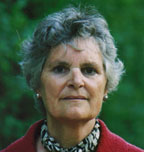
Seattle Times, Sunday, November 10, 2002
A Letter From a GI Revives Old Friendship
©2002 Valerie Kreutzer
Last Christmas I received a thick letter that took me back to my childhood in war-ravaged Berlin in the fall of 1945.
At the time, my family and I were refugees from Pommerania, now part of Poland. We had barely escaped the onslaught of the Russian army, and had just moved into an apartment with crumbling walls. It was sparsely furnished when I answered the bell to find three American soldiers at the doorstep.
“I was one of the three soldiers,” Franklin Dentz reminded me in his Christmas letter from Sanibel, Florida. “I spent many enjoyable times at your home with your parents, your three sisters and yourself. You were only eight but we had fun together and you wanted to come home with me in my army duffel bag as a stowaway. You, at your tender age thought I would wait for you when you grow up. But lo and behold, I married Arlyne in 1950 after graduating from Columbia University’s Engineering School.”
Yes, by now I remembered Franklin: tall, skinny, the youngest of the three GIs, always friendly in his interactions especially with me, the youngest of four girls. We didn’t know each other’s language but we smiled a lot, and I was going to marry him, of course! An old photo shows Franklin kneeling next to me so we could wrap arms around each other. He’s grinning under his army cap while I smile shyly under my braids.
I clearly remember the night of the GI’s first visit, when they explained how they had found their way into our living room. During training for combat in England in the fall of 1944, a local family had loaned Franklin their bible and he entered Belgium and the largest battle in U.S. military history, the Battle of the Bulge, on the wings of Psalm 91: “I will say of the Lord, He is my refuge and my fortress: my God; in Him will I trust.”
Months later, after participating also in the war’s largest airborne operation that dropped him behind German lines east of the Rhine River, he entered Berlin with the legendary “All American” 82nd division.
He had seen friends killed and maimed in action and was glad to be alive. He and his buddies were also interested in contact with English-speaking Germans and were directed to my father, a Methodist minister.
My mother was late on the night of the soldiers’ first visit because she had spent the day scavenging for food in the country, returning with only a handful of potatoes. We were near starvation and it seemed like an act of god when one of the soldiers—was it Franklin? —retrieved a Hershey bar from his back pocket, broke it into nine pieces and passed it around. So that’s what chocolate tastes like, I marveled, letting the little piece slowly melt on my tongue.
We had no food but we shared stories and sang songs, and by the time Franklin and his buddies left in December, we knew how to belt out “Onward, Christian Soldiers” and a few other catchy tunes.
Our American friends sailed home on the Queen Mary. In January 1946, the “All Americans” marched down New York’s Fifth Avenue with a combat record unsurpassed in the U.S. Army. America showered its heroes with gratitude and clouds of confetti.
Franklin had given my father his last 700 marks. “We were astonished and thank you very much for help in our church work,” my father wrote in a letter that Franklin has kept to this day. He would be able to hire an assistant, my father wrote, the money would cover four months of employment.
He also reported that “our little one” is constantly talking about him.
“She thinks with her eight years you will wait for her and mother said to her: ‘Franklin is a tall man and you are a little kid.’ She answered: ‘In a few years I am also tall and fitting!’”
Franklin’s Christmas letter included a copy of a card I had sent. “As I hear you are going to school again. Now we both have the same life. I am learning English and when I come to America I shall speak. I send you greetings and a kiss for good night!”
By the time I came to America on a scholarship, Franklin and I had long lost track of each other. He recently learned of my whereabouts through an article I had written for a Sunday magazine. His Christmas letter triggered an avalanche of memories. Buried beneath them were old scars that easily rupture.
“When I heard on TV a reference to the deaths in the World Trade Center,” Franklin recently wrote, “I was suddenly back 56 years ago, landing in the middle of the German troops, and tears streaked down my face.” His confession reminded me of my own tears when I see treks of refugees and starving children.
We witnessed harrowing times, but for a little while we former enemies bridged different worlds and ages with smiles, chocolate and a goodnight kiss. I look at us linking arms in the midst of a devastated Berlin and think that the snapshot is worth framing.
